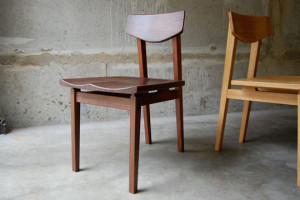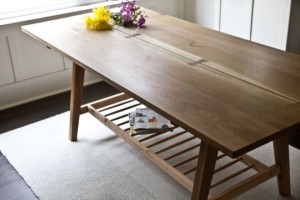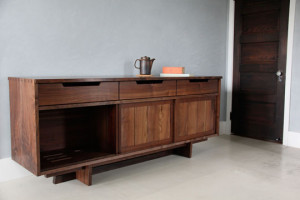A friend who has been looking for a modern dining table alerted me to 16th Workshop, a Seattle-based artisanal studio that designs and makes contemporary furniture from sustainably harvested or salvaged Northwestern hardwoods. Founded in 2008, the workshop is a true family business comprising a husband-and-wife team, Chris Armes and Sharon Khosla, who operate out of their small urban home in the city’s Central District. Both received Master of Architecture degrees from the University of Washington—alma mater of legendary woodworker George Nakashima—before turning to furniture making. “We are still architects through and through,” Chris says. “We are just forming space on a smaller scale, conceiving our work as part of a larger context rather than as isolated works of object art.”
I was very taken with the plainspoken beauty, everyday usefulness, and fine workmanship of the couple’s solid-wood tables, chairs, cabinets, chests, and shelves. “We try to balance modernism and craft in an effort to capitalize on the qualities of both,” Chris says. “We attempt to design things that work well and are a pleasure to use.” Mission accomplished. Here are three of my favorite 16th Workshop pieces.

The Batto chair by 16th Workshop, shown here in Western walnut and Oregon white oak, is also available in Oregon ash.
The Batto chair, one of 16th Workshop’s more recent designs, can be used as a dining, task, or side chair. Available in three handsome hardwoods—Western walnut, Oregon white oak, or Oregon ash—the Batto avoids screws or bolts and is assembled using hand-cut mortise-and-tenon or sliding dovetail joints alone. Though foursquare and sturdy, the chair appears light and airy because the elegantly curved seat and back elements seem to float free of the powerfully muscular frame. “It’s an idea that’s been around forever, but we thought we’d give it a try,” Chris says. Like most of the workshop’s pieces, the chair is finished with environmentally friendly tung oil, which is applied by hand over several weeks to allow it to cure properly. Initial coats are thinned with a non-toxic citrus solvent to allow the oil to penetrate, providing greater protection while retaining the tactile quality and visual beauty of the wood grain.
Intended for dining, the Thai table includes a shaved-spindle shelf suspended low between its four legs. “It was initially designed for some Thai friends of ours,” Chris explains. “They like to read and work at the dining table, so they needed a place to store their laptops, books, and newspapers at mealtime.” Like the Batto chair, the base of the Thai table is free of screws or bolts while the two hardwood planks forming the top are joined with a series of butterfly splines. “The splines serve a real functional purpose,” Chris says, “But also, and almost more importantly, they communicate the living, breathing quality of the wood to anyone using the table.” The Thai table was a merit winner for Interior Design magazine’s Best of Year Awards 2009.
“Credenza 1 is what I like to call ‘Japanese farm kitchen’ in outlook, although more finished than that idea,” Chris says of 16th Workshop’s well-proportioned storage unit, which is available in Western walnut or Oregon white oak. “I feel it evokes simple, humble, everyday use, serving as almost a stage set for day-to-day activity.” The case, which is made from bookmatched boards, is backed by a solid-wood figured panel so the credenza can be used as a freestanding room divider. While a thoroughly practical piece of functional furniture, the credenza is also a fine showcase for the natural beauty of the regionally sourced hardwoods. “Oregon black walnut is particularly stunning,” Chris says. “It has an amazing array of colors because of the minerals in the soil up and down the Willamette Valley, where I’m from. When I design, I keep in mind that I don’t have to do much because I’m working with incredible material. In fact, I let the wood do all the talking.”
16th Workshop
353 16th Avenue
Seattle, WA 98122
www.16thworkshop.com





